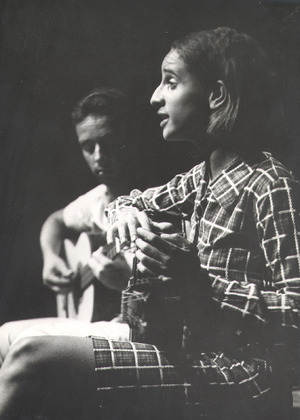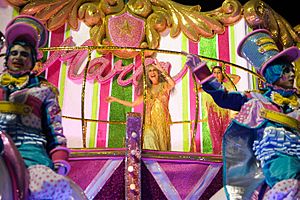Maria Bethânia facts for kids
Quick facts for kids
Maria Bethânia
|
|
|---|---|

Maria Bethânia in 2014
|
|
| Born |
Maria Bethânia Viana Teles Veloso
18 June 1946 Santo Amaro, Bahia, Brazil
|
| Occupation |
|
| Years active | 1965–present |
| Spouse(s) | Gilda Midani |
| Parent(s) |
|
| Relatives | Caetano Veloso (brother) |
| Musical career | |
| Genres |
|
| Instruments |
|
| Labels | |
| Associated acts |
|
Maria Bethânia Viana Teles Veloso (born June 18, 1946) is a famous Brazilian singer and songwriter. She was born in Santo Amaro, Bahia, Brazil. Maria Bethânia began her music career in Rio de Janeiro in 1964. She became known as "The Queen of Brazilian Music" because of her amazing talent.
Her popularity grew quickly with shows all over Brazil. Her song "Carcará" in 1965 made her a big star. She has won more awards than any other artist at the Brazilian Music Awards. Maria Bethânia is the sister of well-known singer-songwriter Caetano Veloso. She has released 50 studio albums over 47 years. She is one of the top 10 best-selling music artists in Brazil, with over 26 million records sold. In 2012, Rolling Stone Brasil magazine named her the fifth-greatest voice in Brazilian music.
Contents
Early Life and First Steps in Music
Maria Bethânia was the sixth of eight children. Her parents were José Telles Veloso and Claudionor Viana Telles Veloso, also known as Dona Canô.
Her brother, Caetano Veloso, chose her name. It came from a popular song called "Maria Bethânia" by composer Capiba.
When she was a child, Maria Bethânia dreamed of becoming an actress. Music was always a big part of her family life because her mother was a musician. When she was 13, her family moved from Santo Amaro to Salvador, Bahia. This move allowed her to explore the artistic and intellectual groups in the city. She also started visiting theaters.
When she was 16, her brother Caetano asked her to sing for a film soundtrack. She said no at first. But the film's director, Álvaro Guimarães, liked her voice. He then invited her to perform in a musical called Boca de Ouro in 1963. This time, Maria Bethânia said yes. It was her first time singing on stage for an audience. She opened the play by singing a samba song.
In the same year, Maria Bethânia and her sister met singers Gilberto Gil and Gal Costa. Caetano was asked to create a show to open the Teatro Vila Velha. The four artists worked together. In 1964, they put on a show called Nós, por exemplo (We, for example).
The show was a big hit. They performed it again later with singer-songwriter Tom Zé. That same year, the group created another show called Nova Bossa Velha e Velha Bossa Nova (New Old Bossa and Old New Bossa). Also in 1964, Maria Bethânia performed her own musical, directed by Caetano and Gil. It was called Mora na Filosofia (Lives in Philosophy).
She continued performing with her brother, Gilberto Gil, Gal Costa, and Tom Zé. During one of these shows, the bossa nova musician Nara Leão offered Maria Bethânia a chance. She asked her to take her place in a series of performances called "Opinião."
Music Career Highlights
Maria Bethânia released her first song, "Carcará," in 1965. It was a protest song. Around this time, she was performing in nightclubs and other places across Brazil. The song also led to an offer from RCA Records to record for them. Maria Bethânia changed record labels several times in the 1970s.
In 1973, she released Drama, Luz Da Noite. On this album, she sang traditional Brazilian songs and added literary ideas. In 1977, Maria Bethânia went on tour and released a gold-certified album. Both were named Pássaro da Manhã. A year later, she released Álibi, which also sold over a million copies and was gold-certified. By the late 1970s, Maria Bethânia's music became more traditional. She moved away from the Tropicalismo style that her friends, like Caetano Veloso and Gilberto Gil, were playing.
During the 1980s and 1990s, Maria Bethânia kept recording and performing. Her 1993 album, As Canções Que Você Fez Para Mim, was the most successful album in Brazil that year.
In 1976, she released a live album with Doces Bárbaros. This was a Música popular brasileira supergroup. The group included Gilberto Gil, Caetano Veloso, Maria Bethânia, and Gal Costa. These are four of the biggest names in Brazilian music history. A documentary film was made about the band in 1977. In 1994, they performed a special concert to honor the Mangueira school of samba.
A French filmmaker, Georges Gachot, made a documentary film about her called "Musica é perfume." It was shown all over the world. In 2008, she recorded an album with Cuban singer Omara Portuondo. They also released a live DVD.
In 2015, her album Meus Quintais was nominated for a Latin Grammy Award for Best MPB Album.
Personal Life
Maria Bethânia moved to Rio de Janeiro by herself in 1963, when she was 17. She still lives there today. She is a very private person and is not often seen at social events. She lives in a quiet neighborhood, close to nature, away from the busy city. Maria Bethânia does not have children. She follows Brazilian religions of African origin, like Candomblé.
She is married to stylist Gilda Midani.
Discography
Maria Bethânia has released many albums throughout her career. Some of her most famous works include:
- Maria Bethânia (1965)
- Drama, Luz da Noite (1973)
- Pássaro da Manhã (1977)
- Álibi (1978)
- Mel (1980)
- 25 Anos (1990)
- As Canções Que Você Fez Pra Mim (1993)
- A Força Que Nunca Seca (1999)
- Maricotinha (2001)
- Brasileirinho (2004)
- Dentro do Mar Tem Rio (2006)
- Omara Portuondo e Maria Bethânia (2008)
- Meus Quintais (2014)
Filmography
Maria Bethânia has appeared in several films and documentaries.
Motion Pictures
- O desafio
- Garota de Ipanema
- O homem que comprou o mundo
- Quando o carnaval chegar
Documentaries
- Improvisiert und Zielbewusst / Cinema Novo
- Enredando sombras
- Além-mar
- Saravah
- Certas palavras com Chico Buarque
- Brasil
- Chico e as cidades
- Biblioteca Mindlin - Um mundo em páginas
- O ovo
- Vinicius - Quem pagará o enterro e as flores se eu me morrer de amores
- O sonho acabou [Phono 73 - O canto de um povo]
- Viva volta
- Maria Bethânia: Music Is Perfume
Short Films
- A Última Ceia segundo Ziraldo
Tours
Maria Bethânia has performed in many tours and shows throughout her career. Some of them include:
- Nós, por exemplo (1964)
- Opinião (1965)
- Arena canta Bahia (1966)
- Rosa dos Ventos (1971)
- Drama - Luz da noite (1973)
- Chico & Bethânia (1975)
- Os Doces Bárbaros (1976)
- Pássaro da manhã (1977)
- Maria Bethânia e Caetano Veloso (1978)
- 20 anos (1985)
- 25 anos (1990)
- As canções que você fez pra mim (1994)
- A força que nunca seca (1999)
- Maricotinha (2001)
- Brasileirinho (2004)
- Omara Portuondo e Maria Bethânia (2008)
- Amor, Festa, Devoção (2009/2010)
- Carta de Amor (2012/2013)
- Abraçar e Agradecer (2015)
- Show de Rua - Sucessos (2016-2017)
- De Santo Amaro a Xerém - Maria Bethânia e Zeca Pagodinho (2018)
See also
 In Spanish: Maria Bethânia para niños
In Spanish: Maria Bethânia para niños
- List of best-selling Latin music artists



